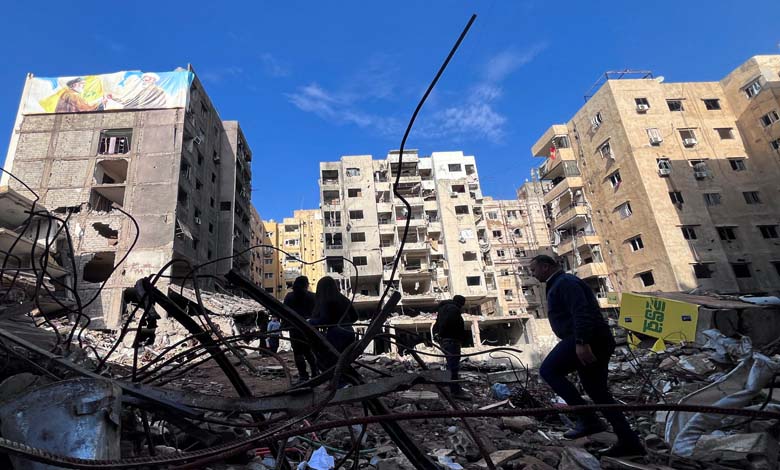The Secrets of Funding: Israel Warns of Smuggling Operations for Hezbollah

Israel has filed complaints with the committee overseeing the ceasefire in Lebanon, accusing Iranian diplomats of transferring millions of dollars to Hezbollah.
According to these complaints, Iranian emissaries travel from Tehran to Beirut’s international airport, carrying suitcases filled with US dollars.
Israel also claimed that Turkish citizens are involved in transferring funds from Istanbul to Beirut by air, as reported by The Wall Street Journal.
-
From Basta to Bazourieh: Hezbollah Strongholds “Ignite” Lebanon
-
Israel Threatens Hezbollah Leaders: Defeating the Party with the Weapon of “Chaos”
Role of the Ceasefire Supervisory Committee
The committee, which includes representatives from Israel, Lebanon, the United States, France, and the United Nations, does not have the authority to impose sanctions, but it has passed the complaints on to the Lebanese government.
Some of the concerned governments confirmed they were aware of Iran’s use of the airport for smuggling operations, or consider the allegations credible.
According to the ceasefire agreement, Lebanon is required to secure its ports and entry points to prevent the flow of weapons and related materials to armed groups like Hezbollah, which is classified as a terrorist organization by the United States. However, the agreement does not specifically address cash transfers.
-
After his death… Who is Salim Ayyash, Hezbollah member convicted of killing Rafic Hariri?
-
Does Hezbollah’s Defeat Mark the End of the Iranian Era?
Implications of Hezbollah’s Funding
Iranian money transfers to Hezbollah could escalate tensions between Israel and Tehran’s allies.
During two months of intense fighting last fall, Israel killed senior Hezbollah leaders, inflicted heavy losses on its ranks, and destroyed part of its missile arsenal.
Israel insists on preventing Hezbollah from rebuilding its capabilities, threatening to bomb Beirut’s airport if it is used to smuggle support to the group.
Despite the cessation of hostilities for the past two months, Israel has carried out hundreds of strikes on Hezbollah targets, claiming it violated the agreement, including last Tuesday’s attacks on vehicles said to be transporting military equipment.
-
Hezbollah relies on new leadership whose members are unknown to Israel
-
Hezbollah and the Death of Nasrallah… the End of an Era?
Attempts to Monitor Smuggling
On January 2, Lebanese authorities searched an Iranian Mahan Air passenger flight after a report claimed it was carrying money for Hezbollah.
An Iranian diplomat on board the flight refused to comply with procedures, entering Lebanon with two suitcases that Iran stated contained documents and money for embassy operations, according to the Lebanese Ministry of Foreign Affairs.
Hezbollah needs funding to compensate for its losses in the recent conflict, where many of its members were killed or wounded, and its strongholds in southern Lebanon and southern Beirut suburbs were damaged, according to Lebanese security sources.
-
“New Phase”: Hezbollah Announces Escalation of Clashes with Israel
-
Hezbollah Prepares for War of Attrition with New Leadership to Lead the Battle
The group also uses the funds to pay salaries to its members, support the families of the victims, compensate the affected, and finance its ongoing social programs.
Israel’s Efforts to Target Hezbollah’s Funding Sources
Throughout the past year, Israel has sought to target Hezbollah’s funding sources to weaken it and slow its recovery, assassinating key figures responsible for financing the group from Iran, and conducting airstrikes during the recent conflict on sites storing money and gold, including branches of Al-Qard Al-Hassan, a bank sanctioned by the US for its role in financing Hezbollah.
Matthew Levitt, a former official at the US Treasury Department, stated that Hezbollah is under financial pressure, having lost large amounts of money and now facing enormous expenses.
Despite Iran’s economic crisis due to sanctions, it will not abandon support for Hezbollah, which it sees as a strategic tool against Israel.
-
One of them was a missile system commander… Israel kills Hezbollah leaders
-
Hezbollah Foils Israeli Ground Incursion Attempts
Some reports suggest Hezbollah is struggling to cover its financial commitments. A Lebanese charity official mentioned that Hezbollah experts visited the affected areas but underestimated the cost of reconstruction, leading to widespread dissatisfaction among the population.
However, a source close to Hezbollah denied a liquidity crisis, confirming that compensation is paid to damaged homes, ranging from $12,000 to $14,000 per year for rent, with additional payments for furniture.
Future Challenges
Since the ceasefire in November, Al-Qard Al-Hassan reopened 28 branches, and Hezbollah issued checks worth $500 million, signaling that money continues to flow.
-
Targeted by Hezbollah: What Do We Know About the Israeli Galilout Base?
-
Hezbollah and Revolutionary Guard Experts under Houthi Suspicion: New Arrangements in Yemen
However, the extensive damage to Lebanon, along with increased monitoring of support through Syria and Beirut’s airport, will affect Hezbollah’s ability to fully finance reconstruction.
Until recently, Syria was the main route for smuggling money and weapons to Hezbollah, but the fall of the Assad regime in late 2023 has increased the importance of Beirut’s airport, according to informed sources.
Despite Lebanese assurances that the military strictly controls the airport, former American officials have warned that Hezbollah may use its influence to avoid strict inspections, which raises concerns about the ongoing flow of funds to the militant group.
-
Hezbollah Engages in Violent Clashes with Israeli Army near Border
-
The Role of Hashem Safi al-Din in Hezbollah: Is He Considered the Second in Command After Nasrallah?
-
The Sole Survivor of Hezbollah’s Leadership: Who Is Abou Ali Reza?
-
A $7 Million Bounty on Its Leader: What Is Hezbollah’s Most Dangerous Unit, “The Shadow Unit”?












